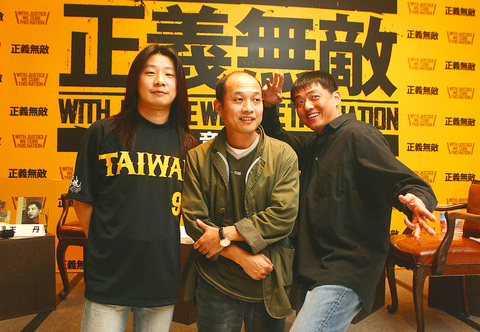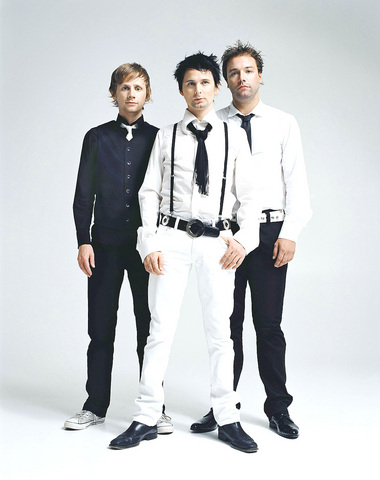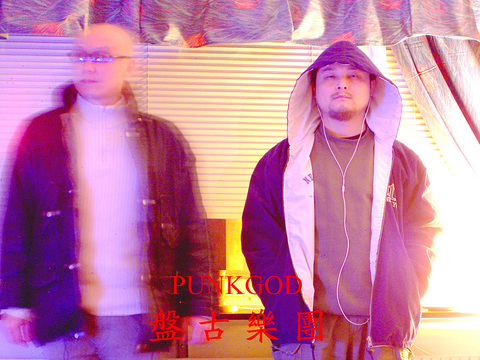Prog-tinged indie rockers and two-time Brit Award winners Muse join eight Taiwanese and foreign bands at today's Spirit of Taiwan (正義無敵) music fest, the latest incarnation of Taiwan Rock Alliance's (TRA) annual concert held to commemorate the 228 holiday.
The lineup includes Japanese punk girls Akiane (秋茜), anarchist indie rockers LTK Commune (濁水溪公社), revolutionary Czech group Plastic People of the Universe, exiled Chinese band Punk God (盤古), and US punk and melodic hardcore band Strike Anywhere. The festival runs from noon to 10:30pm at Taipei's Zhongshan Soccer Stadium (中山足球場). NT$1,500 tickets are available at the door.
Originally called "Say No to China" and later renamed "Say Yes to Taiwan" (the Chinese name "反中國併吞和平演唱會" translated as "Anti-China annexation peace concert") the concert has been held annually since 2000 on or around the 228 holiday, which commemorates the 1947 massacre of an estimated 20,000 Taiwanese by Chinese Nationalist Party (KMT) troops.

PHOTOS COURTESY OF TRA
Organizer and TRA head Freddy Lim (林昶佐) — whose death metal band Chthonic (閃靈樂團) takes the stage at 7:40pm — said the festival was given a new name to promote reconciliation amid Taiwan's mounting political and social problems. In recent years 228 has taken on an increasingly powerful meaning, especially since the rise of the Democratic Progressive Party (DPP), driving an enormous wedge between the ethno-cultural entities described by the terms Mainlanders (外省人) and Taiwanese (本省人).
Unlike past concerts that protested China's military threat or efforts by MTV and other entertainment media outlets to cozy up to Beijing, this year's themes are national unity, solidifying Taiwan's democracy and resolving conflicts left over from the country's authoritarian past.
Several of the foreign bands have a history of performing at human rights-related events — Muse performed at Live 8 and the Frank Zappa/Velvet Underground-influenced Plastic People of the Universe were instrumental in Czechoslovakia's resistance against communism. Others are known for their political stances — Strike Anywhere rails against police brutality and capitalism, Punk God's slogan is "revenge for the people" (為人民報仇), and Akiane frontwoman Moe Suzuki has marched with DPP members and written political music about Taiwan.

"We're strong believers in rock 'n' roll as the music of protest," said Punk God singer Ao Bo (敖博), who along with fellow band member Duan Xinjun (段信軍) decided not to return to China after performing at Say Yes to Taiwan a few years ago. During a stopover in Bangkok a friend called Duan to tell him that Public Security Bureau officers were casing his parents' home. Duan and Ao Bo received political asylum from and now live in Sweden.
This year's musical lineup is smaller than usual but performance-wise contains few weak links. LTK is known for its raucous and sometimes incendiary onstage antics, Tizzy Bac always attracts a legion of eager fans, and earlier this month Muse won a Brit Award for best British live act — the second time they have received the honor.
Also scheduled are screenings of films like Hotel Rwanda and The Story of 228 (傷痕二二八) and brief speeches on human rights between sets. A portion of the profits from Spirit of Taiwan will be donated to Amnesty International, Taiwan Association for Human Rights and Forum Asia Democracy.

In recent press conferences and television appearances, Freddy Lim has emphasized the inclusive nature of this year's event. The musicians, filmmakers and actors behind it represent all of Taiwan's ethnic and groups and both side of the pan-blue/pan-green divide.
On a Web forum for Muse fans, a poster who identified herself as a Taiwanese resident of New Zealand was spreading the message that the festival was "directed towards Taiwan's internal politics. … Anyone who'd still be so concerned about our neighbor across the strait would be very ignorant."
But another fan was unhappy about Muse's decision to headline the concert: "It's just that [the] theme of the festival that [sic] makes me feel not so comfortable … . It's an internal thing in China after all."
Speaking to the Taipei Times on Monday, Lim said that a who's who of Taiwan's political leaders, from KMT heavyweights Ma Ying-jeou (馬英九) and Wang Jin-pyng (王金平) to DPP Premier Su Tseng-chang (蘇貞昌) and President Chen Shui-bian (陳水扁), have promised to attend and sign a pledge to bring "transitional justice" to Taiwan.
Lim said the goal was a process similar to South Africa's Truth and Reconciliation Commission, in which the government opens all files related to 228 and the subsequent White Terror and the perpetrators are forgiven if they tell victims the truth about their deeds. "It will be a historic moment. Everyone should be there," he said.
Zhongshan Soccer Stadium is located at 1 Yumen St, Taipei (台北市玉門街1號), next to the Yuanshan (圓山) MRT station. For more information, visit www.spiritoftaiwan.com.

The primaries for this year’s nine-in-one local elections in November began early in this election cycle, starting last autumn. The local press has been full of tales of intrigue, betrayal, infighting and drama going back to the summer of 2024. This is not widely covered in the English-language press, and the nine-in-one elections are not well understood. The nine-in-one elections refer to the nine levels of local governments that go to the ballot, from the neighborhood and village borough chief level on up to the city mayor and county commissioner level. The main focus is on the 22 special municipality

The People’s Republic of China (PRC) invaded Vietnam in 1979, following a year of increasingly tense relations between the two states. Beijing viewed Vietnam’s close relations with Soviet Russia as a threat. One of the pretexts it used was the alleged mistreatment of the ethnic Chinese in Vietnam. Tension between the ethnic Chinese and governments in Vietnam had been ongoing for decades. The French used to play off the Vietnamese against the Chinese as a divide-and-rule strategy. The Saigon government in 1956 compelled all Vietnam-born Chinese to adopt Vietnamese citizenship. It also banned them from 11 trades they had previously

Jan. 12 to Jan. 18 At the start of an Indigenous heritage tour of Beitou District (北投) in Taipei, I was handed a sheet of paper titled Ritual Song for the Various Peoples of Tamsui (淡水各社祭祀歌). The lyrics were in Chinese with no literal meaning, accompanied by romanized pronunciation that sounded closer to Hoklo (commonly known as Taiwanese) than any Indigenous language. The translation explained that the song offered food and drink to one’s ancestors and wished for a bountiful harvest and deer hunting season. The program moved through sites related to the Ketagalan, a collective term for the

As devices from toys to cars get smarter, gadget makers are grappling with a shortage of memory needed for them to work. Dwindling supplies and soaring costs of Dynamic Random Access Memory (DRAM) that provides space for computers, smartphones and game consoles to run applications or multitask was a hot topic behind the scenes at the annual gadget extravaganza in Las Vegas. Once cheap and plentiful, DRAM — along with memory chips to simply store data — are in short supply because of the demand spikes from AI in everything from data centers to wearable devices. Samsung Electronics last week put out word